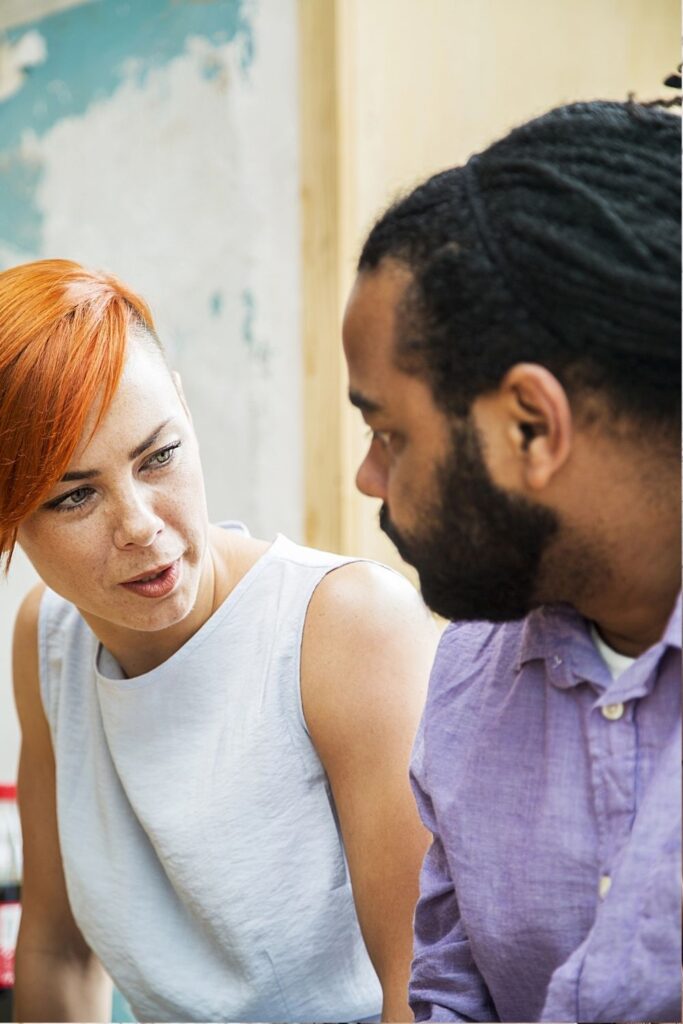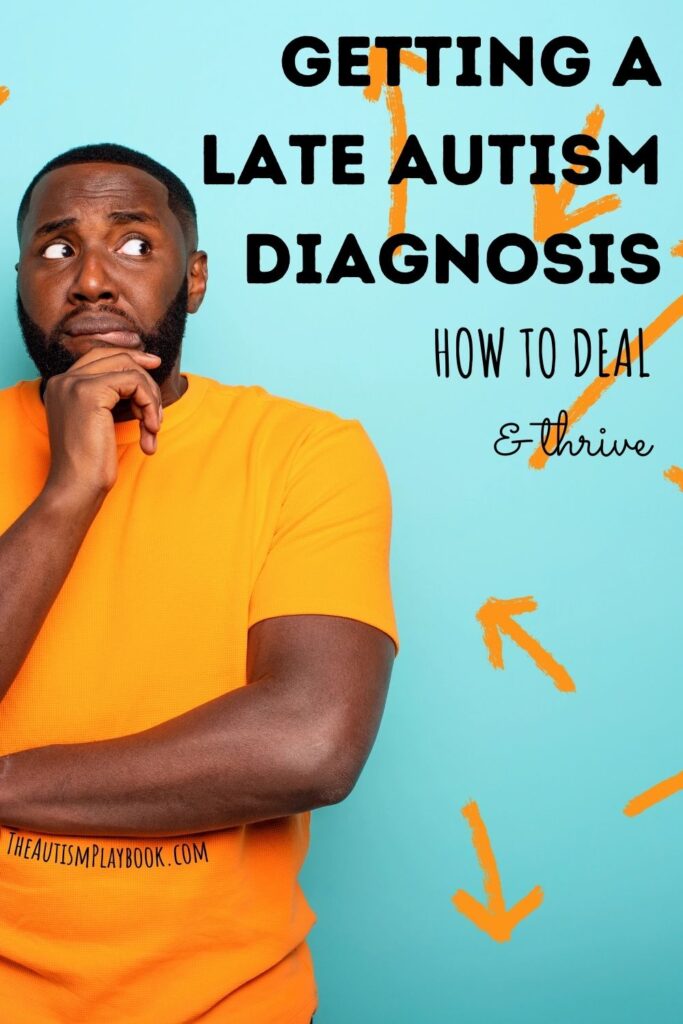I’ll always remember the moment I realized I might be autistic.
After hearing a friend’s description of her own experience with autism spectrum disorder and thinking, “That all seems pretty normal,” I decided to do a little research. That was when I realized for the first time in my life that it was not, in fact, normal.
And suddenly…everything clicked into place. Every early childhood experience, every failed social interaction, every struggle that seemed so much harder for me than for others, there was suddenly an explanation.
I reached out to a counselor, who helped me to schedule an autism assessment at a nearby psychiatric office. At the end of the diagnostic process, two psychiatrists sat down to tell me what I already knew in my heart but needed to see on paper.
“You are autistic.”
Getting a late autism diagnosis left me with a rush of doubt and relief and dismay and vindication all at once. I spent the next day or two in a daze, wondering what it all meant, trying to decide how I felt about it.
But when the rush of emotions eased up a bit, I was left with a big now what. They don’t exactly hand you a manual with your formal diagnosis.
So I did my best to navigate a gray diagnosis in the most practical and fulfilling way possible. I decided to share my path with you today in black-and-white…because I know how much we like clear directions!
If you’re wrestling with a late diagnosis of autism, these are the steps you’ll want to tackle one at a time.
Give yourself time to process.
It’s going to take time to wrap your head around your late autism diagnosis. And as the great Ben Folds once said, “Time takes time, you know.”
You’ll spend countless days where it’s all you can think about, replaying every moment of your life through the fresh lens of an autism spectrum disorder diagnosis. Then you’ll have a stretch of busy days where the thought gets pushed to the back of your mind, behind work meetings, school projects, and social events.
Then you’ll wade through days where you have no thoughts left to think.
You’ll feel like your brain is exhausted and likely overthinking everything. You’ll struggle to muster up even one thought about anything at all.
All of these days are normal.
Remind yourself that you are a human, not a robot, and that you are on a journey that can’t be wrapped up nicely into carefully planned and scheduled calendar boxes. If you want to do it “right,” you’ll need to give yourself all the time you need.
Share the journey with a trusted loved one or counselor.
Getting a late diagnosis of autism is a lot to process. You’ll likely benefit from sharing your journey with a trusted loved one.
Choose one person you believe will listen to and support you without judging you or turning the spotlight on themselves. That could be your partner, a parent, a close friend, anyone you can share your hardest truths and fears with.
Here’s the snag: If you’re autistic, there’s a decent chance you might not have someone like that in your life. Autistic adults aren’t always the best at connecting with others, are we?
Or maybe you don’t have anyone in your life who would understand your new diagnosis or even believe it’s real. (An unfortunate reality in today’s world!)
If you don’t have friends or family members you can share with, it’s totally normal and okay!
In that case, consider confiding in a counselor or finding autism support groups in person or online. Sometimes the best support system is made up of strangers who know first-hand where you’re coming from.
Read as much as you can about others’ experiences.
Autism spectrum disorder is an obnoxiously gray diagnosis, especially considering it applies to such black-and-white thinkers. (Oh, the irony!)
It can feel frustrating to read autism research and textbooks when our personal autistic traits don’t check all of their diagnostic criteria “boxes.” I mean, are we autistic or not?! This is where real life experiences from #actuallyautistic people can save the day by helping you better understand the breadth of your new diagnosis.
Some autistic authors and bloggers and YouTube influencers share autistic traits that I can’t personally relate to at all. Others share such similar experiences to mine that I find myself constantly picking my jaw off the floor. (“Oh my gosh, I’ve always done that too! How did I not realize those were signs of autism?!”)
Read books and blog articles about autism by autistic authors. Watch YouTube videos about autism from autistic creators.
Follow autistic influencers on social media. Join Facebook support groups where autistic people share their real life experiences.
You’ll feel normal and validated and encouraged all at once.

Work with a counselor.
While I appreciated the support of my loved ones when I first received my late autism diagnosis, you know what I appreciated even more? The support of a counselor and other health professionals who actually knew something about autism spectrum disorder.
A psychologist or counselor has the education and training to help you recognize how your autistic traits affect your day-to-day life and offer practical solutions to help mitigate common frustrations. Mine helped me recognize when I needed to communicate with my family members, plan my days out differently, and adapt my expectations of myself.
With that said, not all counselors are necessarily autism specialists.
For the best results, look for a counselor with formal education and training in mental health. Better yet, find one who has worked with autistic patients in the past.
Document your weak spots for awareness.
As I learned more about autism, I found it helpful to keep an ongoing record of the specific traits and challenges that resonated with me.
I didn’t do it to highlight and focus on my weaknesses, but to be able to more easily visualize where challenges were likely to crop up. You can’t make a plan unless you know what you’re planning for, right?
Every time I’d meet with my counselor, I’d bring one or two challenges to the table.
How can I feel less stressed when plans change at the last minute? How can I stop blacking out what someone’s saying when they give me verbal directions?
Having a list helped me to develop a more proactive approach to managing my autistic traits, as well as my overall health and well-being.
Document your strengths for awareness.
On the flip side, making a list of your weaknesses doesn’t give you the whole picture, does it? That’s why I also made a list of my autistic strengths!
By recognizing and constantly reminding myself of my strengths – I’m dependable, I’m detail-oriented, I could lecture for hours on special interests, etc. – I could not only capitalize better on my strengths, but also better appreciate myself! Hey…my autistic traits have actually served me really well in a lot of ways!
Document what makes you come alive, then make time and space for those things.
My late autism diagnosis helped me to realize that a lot of the burnout I had experienced over my lifetime was likely due to cutting out the things that made me come alive. During stressful times when I was juggling work, parenthood, and loads of medical diagnoses, the activities that helped to ground and refresh me were pushed to the side in favor of checking more items off my to-do list.
But these activities are so, so important to autistic people! Without them, we experience more stress, meltdowns, and burnout.
So ask yourself what makes you feel most alive, most yourself.
What activities make you feel giddy just thinking about them? What can brighten your entire day?
We need to take those lists and incorporate them into our daily lives as often as possible! Even teeny tiny pockets of time spent engaging in your special interests can make your stressors outside of that time feel more manageable.
Experiment with stimming and other coping strategies to see if they help.
One thing that surprised me when I realized I was autistic was learning how many of the things I did on a daily basis – fidgeting, rocking, singing, pulling at pages as I read books – were actually “stimming” behaviors.
Stimming (or self-stimulatory behavior) is something autistic people do to manage excess energy and self-soothe. It can include things like body movements, repeating or over-enunciating words, singing, or engaging in other stimulation of the senses or repetitive behaviors.
When I realized the benefits of these “quirks” I had, and the costs of suppressing them, it pushed me into a deep dive of other means of stimming.
I experimented with a few different techniques. And when I found one that resonated with me, I’d incorporate it into my toolbox of coping mechanisms.
Don’t be afraid to research what other autistic people have found helpful in managing their day-to-day stressors and try them out for yourself. You might just be surprised at how impactful those small actions can be on your mental health!
Find opportunities to safely unmask.
As long as we’re talking about special interests and stimming, let’s talk about the elephant in the room: autistic masking.
Autistic masking is a strategy used by some autistic individuals, whether consciously or subconsciously, to suppress or hide their autistic traits and behaviors. The goal of autistic masking is to appear more neurotypical, most often to help blend into social situations.
Now, this doesn’t seem too terrible at face value. Autistic people get to feel more normal and neurotypical people are none the wiser, right?
But if I’m being honest, it’s deeply exhausting. To hold in your true thoughts and natural tendencies all day long is physically and mentally draining. Plus, it can cause you to resent those you’re masking for, even if they haven’t necessarily asked you to mask!
Plus, recent studies have found that autistic people who mask more often are more likely to experience anxiety and depression. In fact, they found that autistic masking may even be linked to an increase in suicidal thoughts and behaviors!
The solution (at least for me) is to look for opportunities to “unmask” and take advantage of them as often as possible.
Maybe you can be your true, weird quirky self at home. Perfect!
Have to keep it together to cook dinner and get your kids in bed? Take advantage of their time at school or relax after you’ve tucked them in.
When I worked in a traditional office setting, I’d catch some time to myself in the empty conference rooms I knew people didn’t walk by often. This time away from my coworkers relieved me for a few minutes to a few hours at a time, from what I now realize was autistic masking.
And commutes to and from work? Heaven. I used those times to stim, talk through things out loud, and blare the same song 1000 times in a row.
Now that I work from home, I have lots more control over my work environment. While I have to mask for meetings, I can be my delightful self for the rest of my work day (to my husband’s complete joy, I’m sure!).
The point is, the more opportunities you can find to be your true self, the easier and less stressful the rest of your day will feel. Look for those pockets of time and just be yourself.
Reset your expectations and standards for yourself.
Before I received my late diagnosis of autism, I used to beat myself up about a lot of things.
For example, I beat myself up over my job. So many of my coworkers, even some I considered to be pretty dumb (Sorry, coworkers!), seemed to effortlessly run circles around me when it came to job performance.
They kept complex topics straight in their heads, portrayed the perfect persona to nail interviews, and didn’t seem to be in the same cringe-y pain I was in social situations. I knew I worked ten times harder just to accomplish the basics of my role and wondered what was wrong with me.
But once I realized I was autistic…and found statistics on autistic unemployment rates…I suddenly felt like a total rockstar! No! Freaking! Wonder!
No wonder I couldn’t hide my true feelings or play office politics. No wonder last-minute meetings and changes to my schedule felt earth-shattering. And no wonder I couldn’t think and respond on the spot.
It turned out I was dealt a different hand than my coworkers and I was actually playing that hand really well!
If you’ve received a late autism diagnosis, it’s time to stop holding yourself to neurotypical standards.
I’m not saying to throw away your goals and aspirations. (I have a lot of those!)
But remind yourself that you might need to tackle those goals at a different pace, or in a different way, than everyone else you know. And that’s totally okay!
Show yourself grace, friend. Build some wiggle room into your personal standards to accommodate an unpredictable medical diagnosis.
It’ll not only help take some pressure off of you, but also lessen your frustrations when things don’t go as planned or expected.

Communicate your needs to others.
This was the hardest part for me. I despise asking for help or favors.
But the truth is that there are loads of things your family members and friends can do to help make your life (and therefore, their lives) easier. And they just aren’t that hard!
I’ve asked my husband to let me know as soon as possible when our plans change. I’ve asked my daughter to come closer and talk louder and slower when I’m struggling with auditory processing. And I’ve asked my boss to be more explicit about what he wants done.
Some people may not catch on right away. Some might even choose not to accommodate your requests.
But when they find themselves repeating what they said for the third time…or not having their unspoken expectations met…they’ll likely remember that you mentioned this challenge and hopefully, show you a bit more grace.
Seek out accommodations where appropriate.
I know, I know, this is still a part of communicating your needs. But it’s important to recognize that not only can your school and workplace hear you out about your needs, but they’re required by law to do so.
In the United States, the Individuals with Disabilities Education Act (IDEA) mandates that every state provide eligible children with a free and appropriate public education that meets their individual needs, including the unique needs of autistic children.
Similarly, the Americans with Disabilities Act (ADA) states that employers are required to make reasonable accommodations for an employee with a disability, as long as the accommodation doesn’t pose an “undue hardship” to the employer.
Now, I don’t like to ruffle feathers any more than you do. But your autistic traits and unique needs may put you at a significant disadvantage in school or at work.
I’m all for hard work and proving yourself. But there are going to be some areas where we struggle due to our autistic traits, no matter how hard we work.
The truth is that autism spectrum disorder deserves just as much consideration as any other medical diagnosis. Why? Because it is just as important and impactful as any other medical diagnosis!
Autistic children will likely require an Individualized Education Program (IEP) to ensure they receive the medically appropriate support they need to learn. In fact, the extra help offered through early intervention often equips autistic children and young people with the tools they need to navigate their unique needs well into adulthood!
Autistic adults may require extra help in the form of accommodations to perform more effectively in the workplace. These accommodations might include a consistent workstation, advance notice of schedule changes, or written directions in lieu of verbal.
Even subtle adaptations to educational and work environments can make a significant impact on the daily lives of autistic people.
Advocating for yourself isn’t asking for special favors. (Autistic people already spend the majority of their daily lives masking for the sake of others.) Advocating is ensuring equal rights and opportunities for autistic individuals.
When others respond poorly, choose to let it go…for your own sake.
You’ll run into a wide range of responses if/when you choose to reveal your late autism diagnosis to others.
One family member told me that autism was a mostly made-up, “woke” diagnosis. Another said I didn’t have autism spectrum disorder, it was just my personality.
Yet another assured me they’d pray Jesus would heal me from it. (Heal me from what? The autistic traits that help form my unique identity?)
These kinds of responses can feel hurtful and insensitive. They can make you want to never tell that person anything personal, ever again. And maybe you shouldn’t!
But, for your own peace of mind, remind yourself that autism is a widely misunderstood medical diagnosis. Then, decide ahead of time that you won’t hold others’ ignorance against them. Doing so will just leave you feeling more awkward and alien than you already do.

Getting a late autism diagnosis can feel unreal and confusing and ostracizing all at once. I know from experience!
But by following these steps, you’ll slowly but surely come to a place of not only better understanding yourself, but learning to mitigate your challenges and play to your strengths.
The fact is that autism makes us unique! It’s not a disease to cure but a new-found strength to navigate.
You just learned something huge about yourself, friend! What are you going to do about it?
I’m rooting for you!
